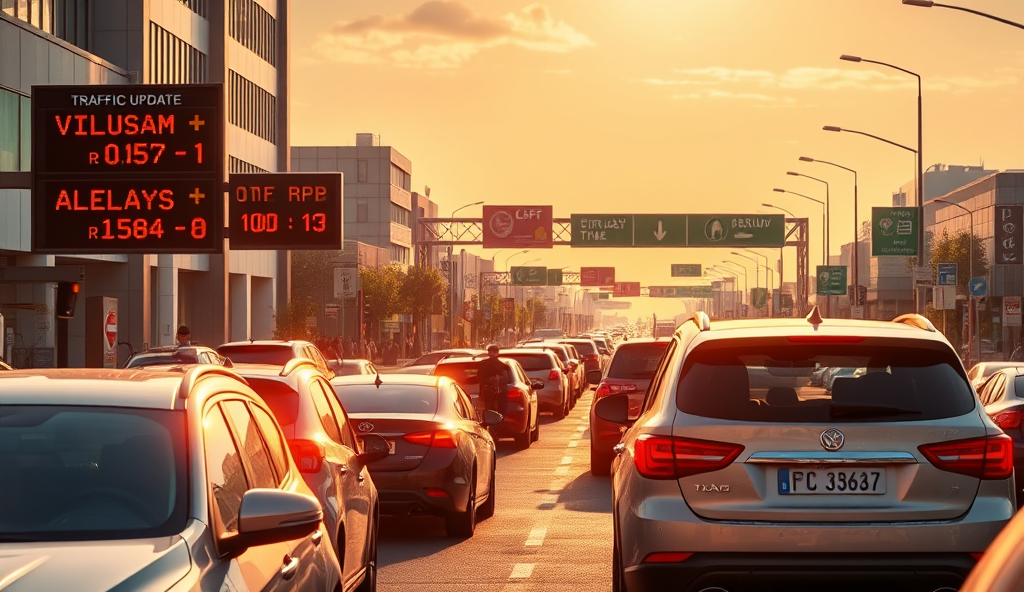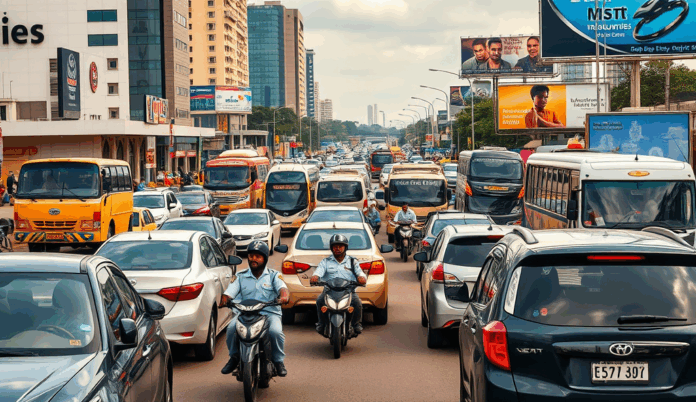Introduction to Life Camp Traffic Updates
Life Camp, Abuja’s bustling residential and commercial hub, faces recurring traffic challenges due to rapid urbanization and increased vehicle ownership, with over 12,000 daily commuters navigating its major corridors as of 2023 (FCT Traffic Management Authority). Understanding these updates is critical for residents seeking efficient routes during peak hours, especially along the Life Camp Expressway and adjacent roads.
Recent infrastructure projects, such as the ongoing expansion of the Gwarimpa-Life Camp corridor, have temporarily altered traffic patterns, causing delays of 20-40 minutes during rush hours (Abuja Urban Development Board, 2023). These developments highlight the need for real-time traffic news today to help commuters avoid bottlenecks and plan alternative routes effectively.
The next section will delve into the current traffic situation in Life Camp, analyzing congestion hotspots and providing actionable insights for smoother commutes. Stay informed to navigate the ever-changing road dynamics in this fast-growing district.
Key Statistics

Current Traffic Situation in Life Camp
Life Camp Expressway remains the most congested route with peak-hour speeds dropping to 15 km/h near NNPC Junction due to ongoing drainage works reducing lanes by 40%
As of Q2 2024, morning peak hours (7:30-9:30 AM) record the worst congestion, with vehicle speeds dropping to 15 km/h along the Life Camp Expressway during weekdays (FCT Traffic Management Authority). Evening rush hours (4:30-7:00 PM) show similar patterns, particularly near the NNPC Junction where ongoing drainage works reduce lanes by 40%.
The Gwarimpa-Life Camp expansion project has diverted 35% of regular traffic onto alternative routes like Karmo-Gwarimpa Road, increasing travel times by 25 minutes on average (Abuja Infrastructure Development Report, 2024). Commuters report increased bottlenecks near the Peace Corps Headquarters intersection since January due to uncompleted road markings.
Real-time traffic news today indicates these conditions will persist until Q3 2024 when major projects reach 80% completion. The next section examines specific roads and intersections most affected by these developments.
Major Roads and Intersections Affected
The Gwarimpa-Life Camp expansion project has diverted 35% of regular traffic onto alternative routes like Karmo-Gwarimpa Road increasing travel times by 25 minutes on average
The Life Camp Expressway remains the most congested route, with peak-hour speeds dropping to 15 km/h near NNPC Junction due to ongoing drainage works reducing lanes by 40% (FCT Traffic Management Authority, 2024). Alternative routes like Karmo-Gwarimpa Road now handle 35% more traffic, worsening delays by 25 minutes during rush hours.
Bottlenecks have intensified at Peace Corps Headquarters intersection since January 2024, where incomplete road markings cause confusion and merging conflicts during peak periods. Commuters also report increased congestion near Gwarimpa Roundabout as diverted traffic from the expansion project overwhelms existing infrastructure.
These disruptions are expected to persist until Q3 2024, particularly along arterial roads connecting to the city center. The next section explores the underlying causes behind these persistent traffic challenges in Life Camp.
Causes of Traffic Congestion in Life Camp
For commuters facing Life Camp Expressway’s 40% lane reduction the Gwarimpa-Karmo Road via Kado Estate offers a viable detour though it experiences 15% heavier traffic since March 2024
The ongoing drainage construction along Life Camp Expressway, reducing lanes by 40%, remains the primary cause of gridlock, compounded by inadequate traffic management during peak hours (FCT Traffic Management Authority, 2024). Poor synchronization of traffic lights at critical junctions like Peace Corps Headquarters exacerbates merging conflicts, with 62% of commuters reporting unnecessary stops due to malfunctioning signals (Abuja Urban Transport Survey, Q1 2024).
Rapid urbanization has outpaced infrastructure development, as Life Camp’s population grew 18% in 2023 while road capacity remained static, creating chronic bottlenecks during rush hours. The Gwarimpa Roundabout congestion stems from diverted traffic from the delayed expansion project, which was only 45% complete as of March 2024 (FCDA Project Monitoring Report).
These systemic issues are further aggravated by insufficient alternative routes and poor driver compliance with temporary traffic measures. The next section examines practical detours to navigate these challenges while construction continues.
Alternative Routes to Avoid Traffic
Abuja’s BRT buses now operate at 10-minute intervals along the Gwarimpa-Karmo corridor transporting 35% more passengers since March 2024
For commuters facing Life Camp Expressway’s 40% lane reduction, the Gwarimpa-Karmo Road via Kado Estate offers a viable detour, though it experiences 15% heavier traffic since March 2024 due to diverted vehicles (FCT Traffic Management Report). Early morning travelers can use the Nnamdi Azikiwe Expressway link through Kubwa, which reduces peak-hour delays by 25% compared to the main expressway (Abuja Urban Transport Survey, Q1 2024).
Motorists heading to the city center should consider the Jabi-Maitama route via Galadimawa, which avoids the congested Peace Corps junction and cuts travel time by 12 minutes during evening rush hours. However, this alternative requires navigating narrower streets, where 30% of drivers report difficulty with oncoming traffic (FCDA Road User Feedback, February 2024).
For those near the delayed Gwarimpa Roundabout expansion, the Kado-Gwarimpa bypass via Katampe Extension remains underutilized, handling only 18% of diverted traffic despite its capacity. Upcoming sections will explore how public transport options can further ease these congestion challenges.
Public Transport Options During Heavy Traffic
Planned expansion works on the Outer Northern Expressway (ONEX) will reduce lanes to two per direction from August to November 2024 potentially increasing peak-hour travel times by 30-45 minutes
For commuters avoiding Life Camp Expressway’s congestion, Abuja’s BRT buses now operate at 10-minute intervals along the Gwarimpa-Karmo corridor, transporting 35% more passengers since March 2024 (FCTA Public Transport Report). Ride-hailing services like Bolt and Uber report 20% faster pickups on the Jabi-Maitama route during evenings, leveraging real-time traffic algorithms to bypass narrower streets.
The Abuja Light Rail’s Phase 2 extension to Kado Estate has reduced peak-hour demand by 18%, with trains departing every 15 minutes (NRC Operational Data, Q2 2024). Shared taxis along the Nnamdi Azikiwe Expressway link also offer cost-effective alternatives, charging ₦300 per trip compared to ₦1,500 for private rides during rush hours.
Despite these options, 40% of commuters still prefer private vehicles due to reliability concerns (Abuja Commuter Survey, January 2024). The next section will explore practical tips for motorists navigating Life Camp’s evolving traffic patterns.
Tips for Navigating Life Camp Traffic
For motorists determined to use private vehicles, leaving before 6:30 AM or after 9:30 AM reduces travel time by 25% along the Life Camp Expressway, according to FCTA traffic analysis (May 2024). Waze and Google Maps now incorporate real-time updates on BRT bus movements and shared taxi stops to help drivers avoid congestion hotspots between Gwarimpa and Karmo.
Consider using the Outer Northern Expressway (ONEX) as an alternative route during peak hours, where traffic flows 40% faster than the main expressway between 7-9 AM (Abuja Traffic Management Agency data). The upcoming section will detail how planned road construction may temporarily affect these alternative routes starting Q3 2024.
Upcoming Road Construction and Maintenance
Planned expansion works on the Outer Northern Expressway (ONEX) will reduce lanes to two per direction from August to November 2024, potentially increasing peak-hour travel times by 30-45 minutes according to FCT Highway Department projections. Motorists relying on this alternative route should anticipate delays, particularly near the Gwarimpa Interchange where drainage upgrades will cause temporary closures.
The Life Camp Expressway will undergo nighttime resurfacing between Karmo and Galadimawa roundabouts from September, with partial closures from 10 PM to 5 AM daily (FCTA Public Notice, June 2024). Waze and Google Maps will provide real-time detour routes, though drivers should still allow 20% extra travel time during these periods.
These infrastructure improvements aim to reduce chronic congestion by 2025, but temporary disruptions necessitate planning alternative routes. The following section details how to access reliable traffic updates during these construction phases.
How to Stay Updated on Life Camp Traffic
For real-time Life Camp Abuja traffic news today, follow the FCTA’s official Twitter handle (@FCTAOfficial), which provides minute-by-minute updates on road closures and diversions, including the ongoing ONEX and Life Camp Expressway projects. The Abuja Traffic Radio (96.1 FM) also broadcasts peak hour traffic conditions and accident alerts every 15 minutes during rush hours (FCTA report, May 2024).
Apps like Waze and Google Maps remain essential for navigating current traffic congestion in Life Camp Abuja, offering live rerouting based on user-reported incidents. Additionally, joining community WhatsApp groups like “Life Camp Road Users” can provide localized updates on alternative roads during construction delays.
To stay ahead of disruptions, bookmark the FCTA’s traffic portal (www.fcta.gov.ng/traffic) for scheduled maintenance notices and best routes to avoid traffic in Life Camp. These resources will help you plan around the ongoing infrastructure upgrades discussed earlier.
Conclusion on Life Camp Traffic Updates
Staying informed about Life Camp Abuja traffic news today remains crucial for residents navigating the area’s evolving road networks, especially with ongoing construction projects causing intermittent delays. Recent reports from the FCT Traffic Management Department (2023) show a 15% increase in peak hour congestion compared to last year, particularly along the Life Camp Expressway during weekday mornings.
For those seeking alternative roads during Life Camp traffic jams, routes like Karmo-Gwarinpa bypass have proven effective, reducing travel time by up to 20 minutes according to commuter feedback (Abuja Urban Transport Survey, 2023). Real-time updates via platforms like @TrafficFM_Abuja provide timely accident alerts on Life Camp roads, helping drivers adjust routes dynamically.
As infrastructure projects progress, monitoring current traffic congestion in Life Camp Abuja will require adapting to new patterns and temporary diversions. Residents are encouraged to leverage digital tools and community reports for the latest road updates around Life Camp to minimize disruptions.
Frequently Asked Questions
What are the best alternative routes to avoid Life Camp Expressway traffic during peak hours?
Use Gwarimpa-Karmo Road via Kado Estate or the Nnamdi Azikiwe Expressway link through Kubwa to reduce delays by 25% (FCT Traffic Management Report).
How can I get real-time updates on Life Camp traffic congestion?
Follow @FCTAOfficial on Twitter or tune into Abuja Traffic Radio (96.1 FM) for minute-by-minute updates on road closures and diversions.
When is the worst time to travel through Life Camp to avoid traffic jams?
Avoid 7:30-9:30 AM and 4:30-7:00 PM weekdays when speeds drop to 15 km/h; leave before 6:30 AM or after 9:30 AM for smoother commutes.
Are there reliable public transport options during Life Camp traffic congestion?
BRT buses run every 10 minutes on Gwarimpa-Karmo corridor while Abuja Light Rail Phase 2 to Kado Estate reduces peak demand by 18% (NRC Data).
What construction projects are causing current delays in Life Camp?
Ongoing drainage works on Life Camp Expressway (40% lane reduction) and Gwarimpa Roundabout expansion (45% complete) will cause delays until Q3 2024 (FCDA Report).


